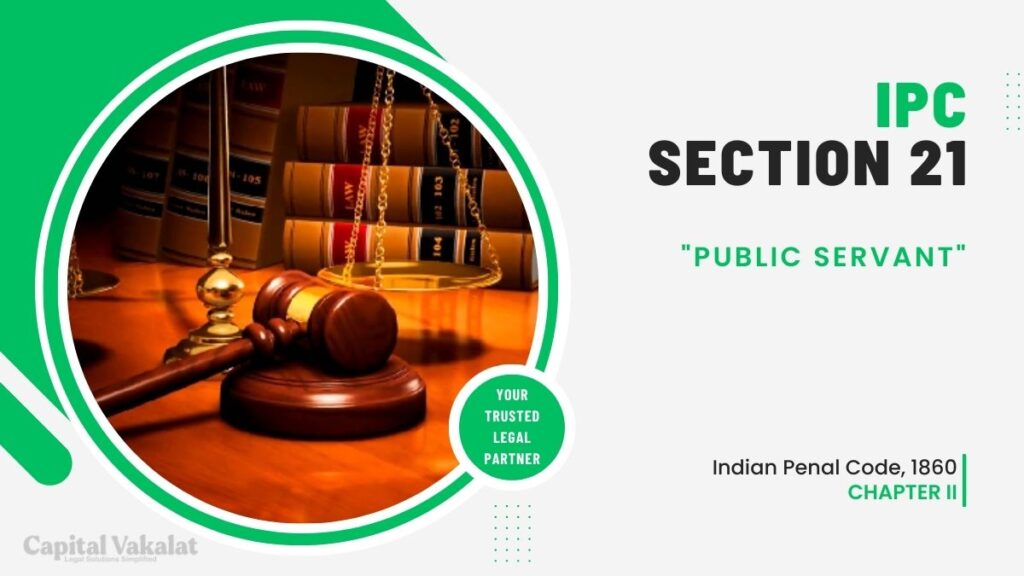In the realm of law and order, Section 21 of the Indian Penal Code (IPC) holds significant importance as it pertains to the concept of a “public servant.” This provision outlines the legal responsibilities, duties, and privileges of individuals who hold positions of authority within the public sector.

Let’s delve into the intricacies of Section 21 IPC and explore what it means to be a public servant in the eyes of the law.
Introduction to Section 21 IPC
Section 21 of the IPC is a crucial statute that elucidates the duties and responsibilities of individuals who are considered public servants. These individuals are entrusted with various governmental functions, and the section aims to ensure their accountability and ethical conduct while discharging their duties.
Defining a Public Servant
A public servant, as defined by Section 21 IPC, encompasses a wide range of individuals working in governmental roles. From elected officials and bureaucrats to law enforcement officers and judges, anyone engaged in public service falls under this category. The primary characteristic that distinguishes a public servant is their authority and duty to serve the public interest.
Roles and Responsibilities
Public servants shoulder the responsibility of upholding the rule of law, maintaining order, and providing essential services to citizens. Whether it’s drafting policies, implementing programs, or ensuring justice, their role is integral to the functioning of a democratic society.
Legal Framework
The legal framework established by Section 21 IPC places certain expectations on public servants. It emphasizes the need for unbiased decision-making, adherence to the law, and the avoidance of any action that could compromise the public’s trust.
Exceptions and Immunities
While public servants are generally held to a high standard of conduct, the law also recognizes that they may need certain protections to perform their duties effectively. Section 21 IPC includes provisions that safeguard public servants from legal action taken against them in good faith and within the scope of their official duties.
Instances of Misuse of Power
Despite their critical role, instances of misuse of power by public servants have been reported. This highlights the importance of maintaining a strong check-and-balance system to prevent abuse of authority.
Accountability and Punishments
Section 21 IPC emphasizes accountability. Public servants found guilty of misconduct or corruption can face severe penalties, including imprisonment and fines. This provision ensures that those who betray the trust of the public are held responsible for their actions.
Upholding Transparency
Transparency in governance is a cornerstone of democratic societies. Public servants are expected to act transparently, maintaining open communication with the public and allowing citizens to access information about government activities.
Challenges Faced by Public Servants
Public servants encounter a myriad of challenges, ranging from bureaucratic red tape and political pressures to the need to balance competing interests. Negotiating these challenges while staying true to their duty requires resilience and ethical integrity.
Importance of Public Servants in Society
Public servants play an indispensable role in shaping the lives of citizens. Their decisions and actions impact the economy, social welfare, and overall progress of the nation. As such, their commitment to public welfare is pivotal.
Balancing Power and Service
The delicate balance between wielding power and serving the public interest is a tightrope that public servants must walk. It requires a deep understanding of the responsibilities that come with their positions.
Recent Reforms and Amendments
Recognizing the need for a modernized legal framework, recent reforms and amendments have been introduced to address the evolving challenges faced by public servants. These changes aim to strengthen ethical standards and streamline administrative processes.
Strengthening Ethical Standards
Ethical conduct is a cornerstone of effective governance. Public servants are expected to uphold integrity, impartiality, and professionalism in all their actions.
Public Participation in Governance
In a democracy, public participation is vital for the success of governance. Public servants are tasked with engaging citizens, seeking their input, and incorporating their feedback into policy decisions.
Conclusion
Section 21 IPC underscores the significance of public servants as custodians of public interest. Their role, though demanding, is pivotal to the functioning of a just and thriving society. Upholding transparency, ethical conduct, and accountability are not mere obligations but the essence of responsible public service. As society evolves, so must the principles that guide our public servants, ensuring that they continue to serve with the utmost dedication and integrity.
Certainly, here are some external resources that provide further details on the topic of “Section 21 IPC: Public Servant”:
- Indian Penal Code – Section 21: This link provides the full text of Section 21 of the Indian Penal Code, detailing the legal provisions related to public servants.
- Transparency International: Explore this global organization’s resources on corruption, accountability, and transparency in governance, which are closely related to the role of public servants.
- Indian Administrative Service: This press release from the Press Information Bureau of India highlights the role and responsibilities of the Indian Administrative Service (IAS), a prime example of a group of public servants in India.
- Role of Public Servants in Democracy: This UN policy brief explores the critical role that public servants play in democratic societies and the challenges they face.
- Central Vigilance Commission: The official website of the Central Vigilance Commission provides insights into its efforts to promote integrity and combat corruption among public servants.
These resources can provide you with a comprehensive understanding of the topic and its implications.
FAQs
Who is considered a public servant?
Public servants encompass a wide range of individuals, including elected officials, bureaucrats, judges, and law enforcement officers, engaged in governmental roles.
What are the key responsibilities of public servants?
Public servants are responsible for upholding the rule of law, maintaining order, and providing essential services to citizens.
How does Section 21 IPC ensure accountability?
Section 21 IPC holds public servants accountable by outlining the consequences of misconduct and corruption, including imprisonment and fines.
Why is transparency important for public servants?
Transparency ensures that public servants maintain open communication with the public and make government activities accessible to citizens.